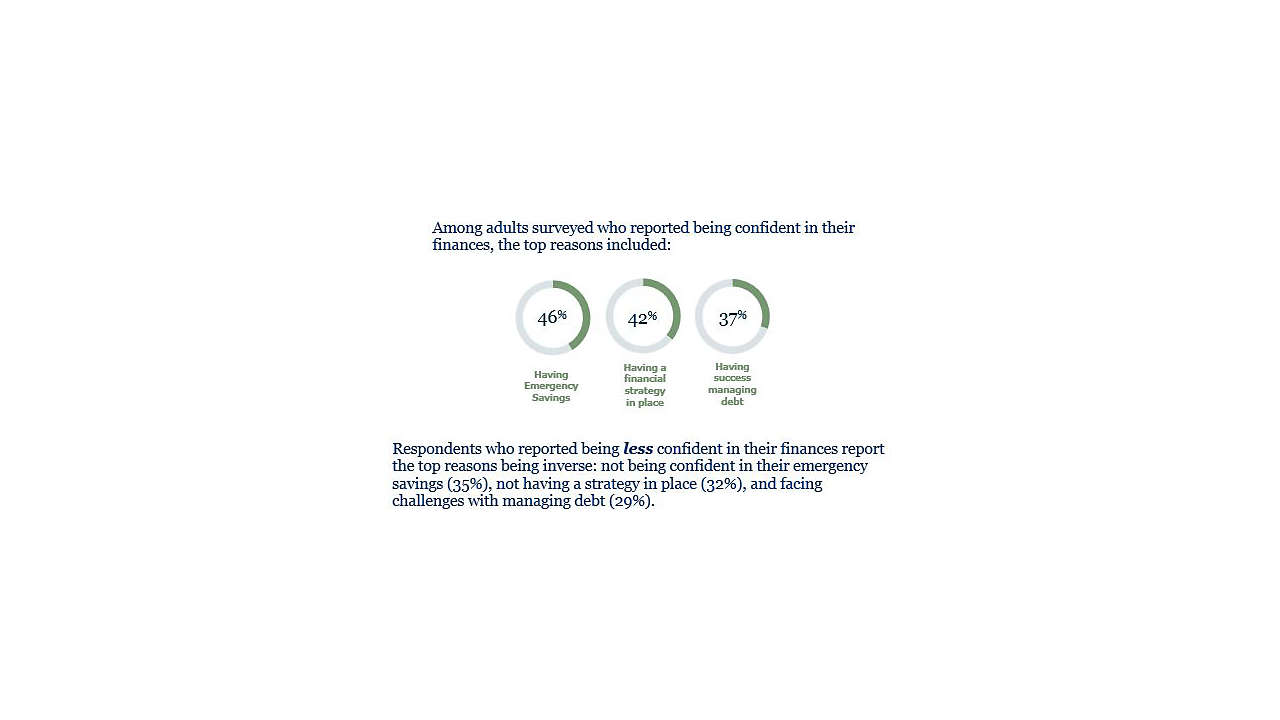PERSONAL FINANCE
Wealth Watch: the top 3 factors to make or break financial confidence.
New York Life | January 26, 2022

New York Life’s latest Wealth Watch survey found that the same three factors are reported across generations as having the highest impact on financial confidence and confidence in achieving financial goals.
Among American adults who reported being confident in their finances, the top reasons were having savings (46%), having a financial strategy in place (42%), and having success in managing debt (37%). These three factors emerge as key pillars to financial confidence, as American adults who say they are not currently feeling confident in achieving their financial goals report the inverse of the above factors as the reasons why. Respondents who are less confident in their finances report the top reasons as not being confident in their emergency savings (35%), not having a strategy in place (32%), and facing challenges with managing debt (29%).

One-in-five adults (20%) report feeling less prepared than their peers to manage debt, and nearly one-third (30%) report feeling less prepared for a financial emergency than their peers – suggesting that these are areas of concern across generations.
Generational Breakdown – What is each group looking for to achieve financial confidence?
Generations differ in their levels of confidence to reach their financial goals, and report interest in differing aspects of financial guidance to help them achieve their goals and increase their confidence in their finances. While a majority of Gen Xers report having confidence in reaching their financial goals (57%), they report lower financial confidence in general than all other generational cohorts; 74% of Boomers reported feeling confident in their finances, followed by 73% of Gen Zers and 70% of Millennials.
When working with a financial professional, one-in-three Millennials and almost one-in-four Gen Xers reported that developing their financial strategy is something they seek from having professional financial guidance (31% and 24% respectively).
Baby Boomers are in a different phase of life where they may require assistance weighing their options when it comes to selecting financial products to assist with executing against their retirement savings plans. Boomers report being most interested in learning about new financial products and resources that are right for them when seeking financial guidance (18%).
Despite the differences in guidance needs and levels of confidence among the generations, the three factors that seem to make or break financial confidence remain having emergency savings, having a financial strategy in place, and successfully managing debt. It's encouraging that people want to build a strong financial foundation and their outlook improves when they do so.
These tie closely to top-reported long-term goals amongst all American adults as well, which are building emergency funds (38%), paying off credit card debt (31%) and being able to retire at their desired age (25%).
As adults of all ages look to a new year with feelings of hope (39%) and uncertainty (28%), human guidance around savings, debt management and retirement preparedness will be key to increasing financial confidence for all generations. Each generational cohort’s path to increased confidence through financial guidance may vary, but these pillars will remain key for financial advisors to address with clients of all ages in 2022.
ABOUT WEALTH WATCH
Wealth Watch is a recurring survey from New York Life that will track Americans’ financial goals, progress toward those goals and feelings about their ability to secure their financial futures, identifying key themes and trends that are emerging about topics like retirement planning, the role of protection-oriented solutions and the importance of financial guidance.
SURVEY METHODOLOGY
This poll was conducted between December 8 and December 11, 2021, among a national sample of 2,200 adults. The interviews were conducted online, and the data were weighted to approximate a target sample of adults based on gender, educational attainment, age, race, and region. Results from the full survey have a margin of error of plus or minus 2 percentage points.
Go back to our newsroom to read more stories.
RELATED CONTENT
Go back to our newsroom to read more stories.
Media contact
Kevin Maher
New York Life Insurance Company
(212) 576-7937
Kevin_B_Maher@newyorklife.com
